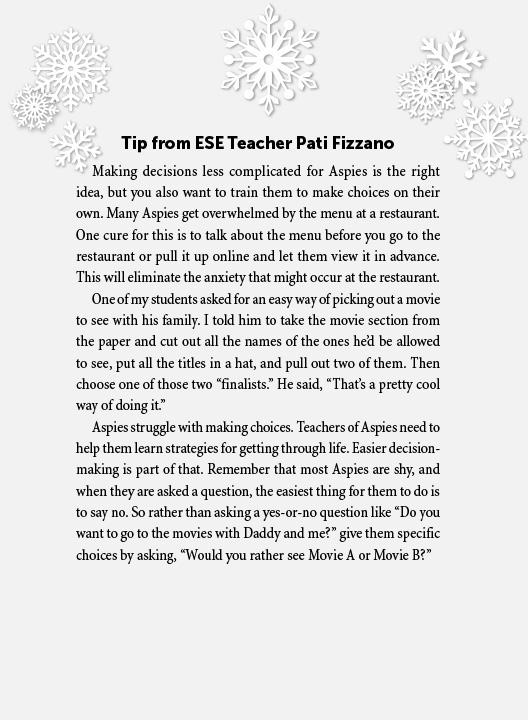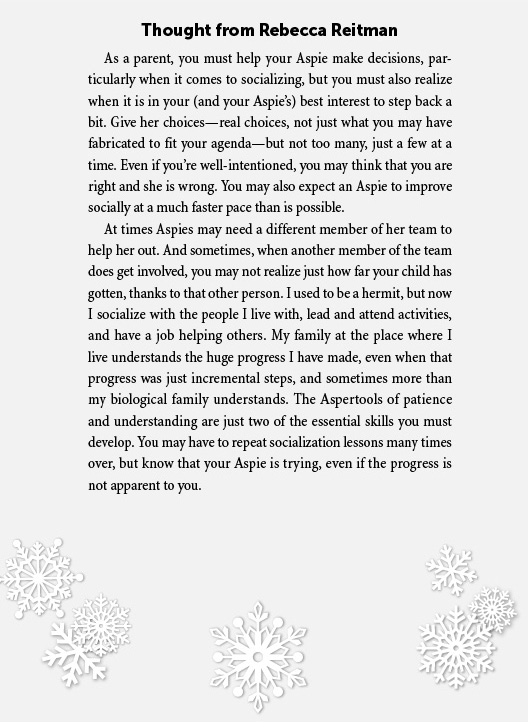
12 Limit Choices to Avoid “No!”
When you make a choice,
you change the future.
— Deepak Chopra
Helpful Hint: If you ask your Aspie if she wants to try a new activity or interact with someone new, her answer will always be no. She is comfortable in her known routine. Asking her open-ended questions with an infinite number of possible answers won’t work either—that will just overwhelm her. For the best result, restate the question in a way that limits her choices.
Principle: The thought of doing anything different, or anything that involves interacting with other people, causes Aspies anxiety. Ask your Aspie if she wants to go to a family dinner on Sunday and she’ll say, “No.” (Maybe “No thanks” if you’re lucky.) In fact, if you ask if she wants to do anything outside of her routine, chances are she’ll simply respond, “No.” Given a choice, she’ll always say no.
It’s a tug-of-war. You want your Aspie to expand her comfort zone; she prefers to remain in that zone, within herself, where life is easier and more predictable. If Aspies had their druthers, that’s where they’d stay forever—living a hermit-like existence in their rooms, with their computers (which many Aspies think of as their best friends). In this comfort zone, there’s not much in the way of social development, but there’s a lot less stress and less anxiety.
After Rebecca finished her one-year internship tutoring math at the school for kids with Asperger’s, I asked the headmistress what she felt would be the best thing for me to do to help Rebecca going forward. She thought it over, then said, “Hackie, don’t give her the choice to say no.”
ACTION PLAN: Go back to that question about the family dinner. The Aspertool is to pose that question not as a close-ended yes or no question but as a multiple-choice question. I don’t mean the type of multiple choice question you often see on an exam, where you can select A, B, C, D, None of the above, or All of the above. I mean something like: “We’re going as a family to have dinner with Grandma and Grandpa. Would you rather go Saturday or Sunday?” This makes it easier for Aspies on several counts. First, they don’t have to figure out anything. You’ve already laid down the law—they are going to the gathering—so there’s no need for discussion of that. All they need to do is pick which day is better. You’ve made their lives—and yours—less complicated by playing to their preference for specifics.18
18 This is not to say that multiple choice options always work. I’ll never forget the time my mother, Ev, presented my cousin Peter, who was then eleven and maybe sixty pounds soaking wet, with one of her own “multiple choice” options. She was preparing a meal of linguini with white clam sauce for me and three of my Jersey City pals, who would devour anything and everything put in front of them. My cousin, who was your classic picky eater—at this point in his life, he had never even tried tuna fish—took one look at what Ev had made, grimaced, and said he wasn’t hungry. If this was his home, his mother would have cooked him a hamburger. But this was not how it worked in my family. Ev told Peter to sit down and eat. Peter said he’d have a bologna sandwich later. Ev said, “Peter, you have two dinner options. You can eat it or you can wear it.” Peter took another look at the pasta swimming in canned clam sauce and said, “Aunt Evelyn, I really can’t eat that.” My mother grabbed his bowl and dumped the contents on his head.


